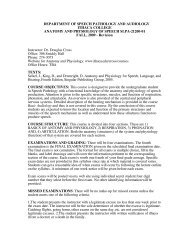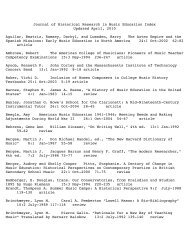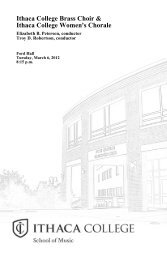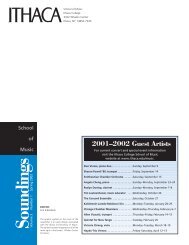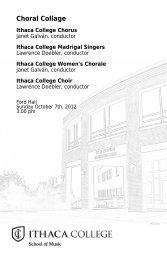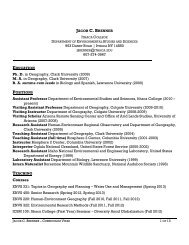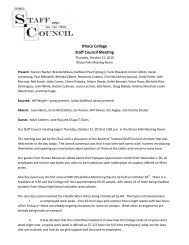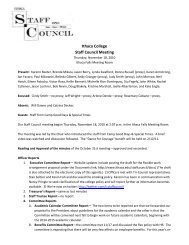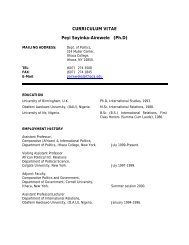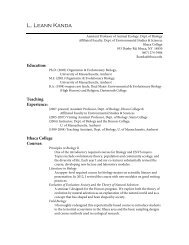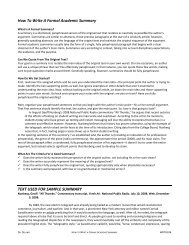A Brief Defense of Empiricism - Ithaca College
A Brief Defense of Empiricism - Ithaca College
A Brief Defense of Empiricism - Ithaca College
Create successful ePaper yourself
Turn your PDF publications into a flip-book with our unique Google optimized e-Paper software.
A <strong>Defense</strong> <strong>of</strong> “Naïve” <strong>Empiricism</strong> page 11 <strong>of</strong> 14<br />
the realm <strong>of</strong> sets is for mathematicians, so logical space is a paradise for philosophers.<br />
We have only to believe in the vast realm <strong>of</strong> possibilia and there we find what we<br />
need to advance our endeavors.” “Modal realism is fruitful; that gives us good reason<br />
to believe that it is true.” But fruitful for what endeavors? Metaphysics? This surely<br />
is dubious support for belief in metaphysical entities. Belief in auras may be useful,<br />
indeed indispensable for some New Age theory, but that hardly suggests that we<br />
should embrace belief in auras A full discussion <strong>of</strong> mathematics would take us too far<br />
afield at this point, but I suppose that acceptance <strong>of</strong> sets rests on their usefulness to<br />
mathematics which is itself indispensable for empirical science. The question at hand<br />
is the dispensability <strong>of</strong> metaphysics. If metaphysics turns out to be indispensable in<br />
the way that mathematics and natural science are, then that would give support in the<br />
way Lewis claims for belief in entities that are useful for metaphysics. There is no<br />
need to point out that this is far from being so.<br />
Where, then, does the construal <strong>of</strong> empiricism as empirical leave<br />
contemporary analytic metaphysics? Many <strong>of</strong> us have been suffering from<br />
metaphysical intoxication for the last thirty years or so, mainly brought on by the<br />
work <strong>of</strong> Kripke, Lewis, and others. We‟ve had a ball these last thirty years with<br />
metaphysics, now it‟s time to return to our senses.<br />
References<br />
Benjamin, A.C. (1941). Is empiricism self-refuting. Journal <strong>of</strong> Philosophy, 38, pp.<br />
564-573<br />
Boghossian, P. (1996). Analyticity reconsidered. Nous, 30, pp. 360-391.<br />
BonJour, L. (1998). In <strong>Defense</strong> <strong>of</strong> Pure Reason. (Cambridge: Cambridge Univ.<br />
Press)<br />
Bradley, F.H. (1893). Appearance and Reality: A Metaphysical Essay. (London:<br />
Swan Sonnenshein & Co)<br />
Cassam, Q. (2000). Rationalism, <strong>Empiricism</strong>, and the a priori. (In P. Boghossian &<br />
C. Peacocke (Eds.), New Essays on the A priori (pp. 43-64). Oxford: Oxford Univ.<br />
Press.)<br />
Crane, T. (2003). Review <strong>of</strong> In <strong>Defense</strong> <strong>of</strong> Pure Reason by Laurence BonJour.<br />
Mind, vol. 112, no. 447, July, 2003, pp. 502-506<br />
Devitt, M. (2005). Reply to BonJour. (In E. Sosa & M. Steup (Eds.), Contemporary<br />
Debates in Epistemology (pp. 118-120). Cambridge, MA: Blackwell Publishers.)<br />
Gibson, R. (1995). Quine on the naturalizing <strong>of</strong> epistemology. (In P. Leonardi & M.<br />
Santambrogio (Eds.), On Quine: New Essays (pp. 89-103). Cambridge: Cambridge<br />
University Press)<br />
Gupta, A. (2006). <strong>Empiricism</strong> and Experience. (New York: Oxford University<br />
Press)



